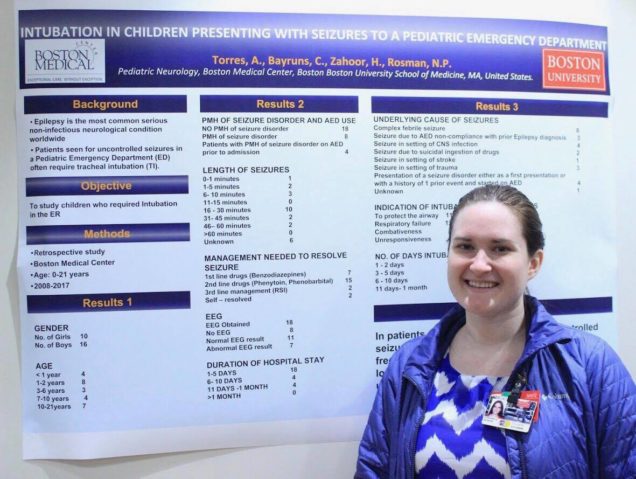ALUMNUS FEATURE: Courtney Bayruns

On April 9, 2018, Boston University School of Medicine (BUSM) hosted its Fourth Annual Carlos S. Kase Neurology Research Symposium where medical students, residents, and fellows had the opportunity to present their clinical research. This is one of the many events hosted by both BUSM and Boston Medical Center (BMC) that welcomes undergraduate students interested in neuroscience and clinical research to attend and gain further insight into the field.
A large exhibit hall decorated with scientific posters is filled with curious students flocking around each presenter. Passionate discussions about new discoveries within the field of neurological disorders research echoes throughout the room. Attendees gather as Courtney Bayruns, a third-year medical student, passionately shares her research on intubation rates in pediatric emergency department patients suffering from seizures. Bayruns eagerly shares her neuroscience journey, which began in the undergraduate neuroscience program at Boston University.
“Say hello to Dr. Lipton for me!” Bayruns enthusiastically asks as she recollects memories from her college years. She graduated in 2015 with a dual degree in Human Physiology and Neuroscience. Bayruns became interested in research during her freshman year while part of the Howard Hughes Medical Institute (HHMI) program and sophomore through senior year when she was funded by the Undergraduate Research Opportunities Program (UROP). During her years as an undergraduate student, Bayruns developed research-oriented skills through the laboratory sections offered in NE203, Principles of Neuroscience, with Dr. Shoai Hattori and other neuroscience courses. “Neuroscience labs in class help build foundational skills like micropipetting and microscopy, which are needed in research,” Bayruns said. “A lot of labs really appreciate the fact that we already have experience with these skills thanks to these classes.” Bayruns particularly enjoyed NE535, Translational Research in Alzheimer’s Disease, with Dr. Lucia Pastorino, because of its application of research in real-world scenarios.
Bayruns is currently finishing her third year of medical school and focusing on pediatric neurology research. At the symposium, she presents her most recent project: Intubation in Pediatric Patients Presenting with Seizures to the Emergency Department. This retrospective study uses BMC patient charts to consolidate data that examines ways to prevent pediatric status epilepticus and adverse outcomes of seizing kids in the Emergency Department. One aspect of Bayruns and her team’s research examines unnecessary intubation rates in pediatric seizure patients. During intubation, a physician inserts a breathing tube into the patient, protecting their airway and providing artificial ventilation. It is thought that intubation rates may increase in the presence of less experienced physicians, but the data is still preliminary. Some children involved in these cases experience febrile seizures caused by fevers and often lack the need for intubation, but receive the intervention nonetheless. Like with most clinical research, more data must be extracted and analyzed until conclusive trends are identified. This analysis will include many patient factors such as age, seizure duration, antiepileptic drugs used, and intubation among others. Her work plans to optimize pediatric seizure preventative care as well as the management of seizing kids in the Emergency Department.
Her undergraduate program, neuroscience labs, and research experiences shaped Bayruns into the person that she is today. “I felt a huge advantage compared to some of my classmates during my neuroscience units in medical school because my major covered the topic in such detail.” She also learned that perseverance is key when trying to enter the realm of research. “Just keep emailing,” Bayruns says when asked how to find a research opportunity. “You may get rejected a bunch of times, but eventually you’ll get a response from a lab you love.” She urges undergraduate students to get involved in research but says that it is okay if you do not start early. “Take your time and be sure to enjoy your undergraduate years.” She hopes to continue her neuroscience journey by attending a pediatric residency and treating children impacted by neurological disorders.
Bayruns still cherishes the memories and experiences that she made in college. “Dr. Lipton and the neuroscience department do a great job at preparing everyone for medical research and research-based jobs.” She also encourages undergraduate students to look into the field of neurology. “You never know,” she playfully jokes, “maybe one day I’ll mentor you as your attending!”
Check out the BUSM Calendar page for similar events to attend: https://www.bumc.bu.edu/busm/calendar/
Writers: Enzo Plaitano, Yoana Grigorova, and Yasmine Sami
Editors: Stephanie Gonzalez and Emme Enojado